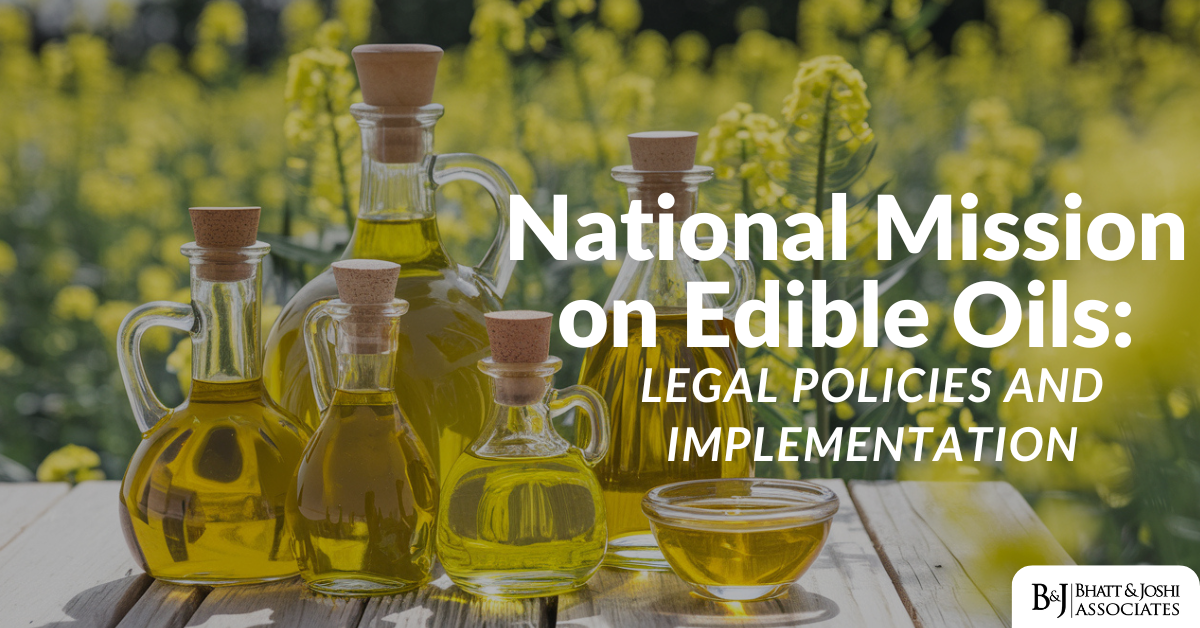Introduction
The National Mission on Edible Oils (NMEO) depicts a ‘game-changing’ initiative on the part of the Government of India to curb the growing dependency on the import of edible oils by India. Given the ever-growing coconut and palm oil imports with productivity falling way behind consumption, this mission is an economic necessity as well as a crucial intervention for achieving food security. The NMEO seeks to enhance domestic production to make India self-sufficient, achieve sustainable agriculture, and mitigate the risk of global oil market volatility. The purpose of this article is to examine the primary regulatory framework, policy initiatives, and judicial action concerning the mission and analyze its likely consequences to India’s agriculture and economy.
The Indian oilseed economy is trapped in a vicious cycle of low productivity, low investment, and high imports. The content-and-context-aided analyses help identify the perceived barriers which include a negative perception of investment climate, insufficiently defined procedural rules, arduous government approval processes, slow land and labour markets, limited commercialized agricultural implements, underdeveloped infrastructure, lack of modern technologies in agriculture, unavailability of seeds, unfavourable weather conditions, and poor plant organism health management. To address these challenges, and pursue, for example, the goal which the government describes as self-sufficiency in palm oil production for domestic use, the authorities will need to set the country’s agricultural economy on a growth path. Apart from the palm oil self-sufficiency policy, there are no policies that aim at closing the oil import gap on a structural basis.
Investing in them to boost productivity will help India achieve its long-awaited self-sufficiency. The aim objective of the National Mission on Edible Oils (NMEO) is to derive sustainable domestic mechanisms that guarantee the country’s oil production requirements are efficiently met with domestically sourced oil crops, reducing the need for oil imports. The rest follows oilseed crop import restrictions and oil extraction infra subsidization.
- Encouraging the use of new technologies and farming practices to increase productivity output.
- Providing incentives within the pricing structure that motivates farmers while stabilizing the domestic market.
- Creating strong infrastructure for processing, distribution, and supply to minimize post-harvest losses and enhance the efficiency of the value chain.
- Improving India’s trade balance, ensuring better price stability for consumers, and reducing the dependence on edible oil imports.
Legal Framework Governing Edible Oils in India
In the case of India, her regulation of edible oils falls within a set of legislative measures and policies with a broad scope that encompasses not only agricultural production but also marketing and protection of the consumer. The following laws are critical in aiding the achievement of the objectives of the NMEO with particular reference to its enforcement:(b) domestic edible oils legislation The Essential Commodities Act 1955: This law allows the government to control production, supply and distribution of certain basic commodities, including oils. This law creates the possibility of imposing stock limits to control hoarding and stabilize prices, especially in scarcity and inflation periods
These laws at the state level govern the marketing of agricultural produce including oilseeds: The Agricultural Produce Market Committee (APMC) Acts. These laws significantly influence the market access and the distribution channels of the farmers. There have been attempts to reform the APMC to facilitate better access and greater flexibility to the farmers in the recent past.
This act controls the use of pesticides and insecticides for oilseeds, which require intensive pest control: The Insecticides Act of 1968. The scope of this act is important so that a farmer can sustainably execute farm management.
This legislation corresponds to oils as AFSMA is to oils, as FSSAI regulates the quality and safety of food: The Food Safety and Standards Act 2006 (FSSAI). Oils must not only be free of adulterants but must also be nourished with health-fulfilling criteria, per the set standards under the FSSAI.
This statute controls the ever-increasing pollution from palm oil plantations and the industrial processing units of palm oil. Compliance with environmental regulations from government authorities must be followed for sustainable development such as assistance and cared ecological control: The Environment Protection Act 1986.
This act acknowledges palm oil cultivation as an agricultural practice that poses a threat to forests due to the deforestation required to create cropland. Oil palm cultivation has led to the destabilization of the forestry ecosystem. This Act is important in these scenarios: The Forest Conservation Act 1980.
Policies Supporting the National Mission on Edible Oils
Achieving NMEO objectives aims for its success to be dependent on the integration of financial, technological, and regulatory policies. The Below policy initiatives aid in achieving such objectives:
Price Support Mechanisms: A vital pillar of this mission is to ensure farmers are getting remunerative prices for their produce. The MSP helps in oil-seeds as it assures a safety net for farmers and protects them from the volatility of market prices. The Government also subsidizes critical inputs like high-quality seeds, fertilizers, and irrigation facilities.
Technology and Research: The ICAR Research Institutes are developing oilseed varieties with higher yields, greater pest resistance, and better adaptability to climate change. Through extension services and training programs, farmers will be educated about these new technologies. The NMEO targets spreading these innovations through farmers’ training and outreach programs.
Financial Incentives: For the establishment of oil palm plantations, the government provides subsidies as a financial incentive. Installing seedlings, caring for the plantation, and processing equipment are subsidized so farmers will be encouraged to switch to oil palm cultivation. There is also an encouragement for public-to-private partnerships to increase efficiency and investment in the edible oil industry.
Import Measure: To minimize competition, the government employs both tariff and non-tariff methods to govern the import of edible oil. Import duties and quotas, as well as quality standards, are set in a way expecting to promote self-sufficiency without jeopardizing the access of consumers.
Implementation Challenges of National Mission on Edible Oils
Despite its cover, the NMEO has several remaining issues which must be solved so that the entire system may function as designed, in hopes of achieving its complete potential.
Land Availability: Cultivation of oilseed, especially oil palm requires cultivation on a vast area of land. The challenge remains to find appropriate land that does not sit on top of forested land or sensitive ecological zones.
Farmer Awareness: A lot of farmers, especially smallholders, who do not understand oilseed cultivation and the accompanying government support schemes remain uninformed. Close this information gap with better awareness is the campaign that is needed.
Infrastructure Deficits: Acknowledgment of the inadequacy or complete lack of infrastructure for processing storage and distribution makes it impossible to improve the supply of edible oil. A particular focus on modernising these facilities is needed to bridge post-harvest losses.
Environmental Concerns: Of great challenge is the deforestation and loss of biodiversity as well as water-using farming involved in oil palm cultivation. To balance these issues, sustainable farming practices with strict environmental policies must be implemented.
Judicial Pronouncements Around Regulations of Edible Oil
In the context of India, the courts have been proactive in interpreting the laws regarding the production, trade, and quality control of edible oils. Some of the landmark judgements in this area are:
Godrej Industries Ltd. v. Union of India (2017): The court confirmed that the government has the right, under the Essential Commodities Act, to impose limits on the stocks of edible oils. The court stressed the importance of curtailing stockpiling and taking necessary steps to ensure adequate availability during shortages.
Centre for Public Interest Litigation v. Union of India (2015): The issue of quality adulteration of edible oils was dealt with by the Supreme Court. The court ordered the relevant authorities to enhance the quality control measures, ensure enforcement of FSSAI regulations, and ensure that the adulterated products were not on sale.
N. Godavarman Thirumulpad v. Union of India (1997): This was one of the most important decisions on the conservation of forests in the context of agriculture. The Supreme Court decided that all oil palm expansion projects contained in these areas were subject to the provisions of the Forest Conservation Act and must be environmentally responsible.
International Comparisons and Lessons
India’s approach to developing its oil palm industries could benefit from learning from Malaysia and Indonesia. These countries have crafted policies that provide incentives to farmers while also ensuring environmental protection. India’s social, economic, and ecological context, however, requires a different solution. The experiences of these countries underscore the need to ensure that economic development does not come at the cost of environmental devastation.
The Way Forward
Much of the success of NMEO depends on how the government meets the implementation hurdles alongside engaging farmers, industry players, and researchers. Innovative policies include:
Fostering awareness workshops for farmers on available incentives as well as better farming practices would be a good start. More attention to research and development is required to create oilseed cultivars that are climate-adaptable and can produce high yields. There will be post-harvest losses due to insufficient processing and storage facilities, therefore, improving these will improve supply chain efficiency. Sustainability policies must also protect against over-exploitation of agriculture alongside strict environmental controls. If the private sector is permitted to actively participate in the edible oil value chain, there will be investment and improvement in innovations which guarantee growth.
Conclusion
The National Mission on Edible Oils has an important impact on the agriculture, economy, and food security aspects of India and it represents an important initiative. If the challenges to implementation including adequate legal and policy outline are met, the goals of self-sufficiency, sustainability, and development for all will be achieved. To achieve the objective of self-dependent edible oil industry in India, constant backing in the form of legal supervision and regulatory control will be needed alongside a joint contribution from all parties involved.













